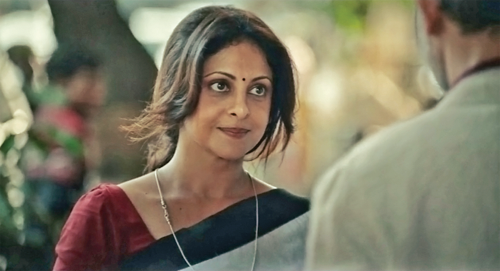
Hindi cinema seldom looks at mature love stories, mainly because our society still frowns at middle-aged people looking for romance; the prevailing notion is that after a certain age, people should think of “such things” (read sex) and spend their time in looking after the family or spiritual pursuits. (Many producers reportedly though of remaking Bridges of Madison County and gave up the idea as unworkable.)
Kanwal Sethi’s low-key film would probably not have worked had it been made for a regular commercial release—at least not without major stars. In Once Again, he casts Shefali Shah and Neeraj Kabi as the older couple falling into a mellow un-nameable love, which is what they need at that point in their lives.
She is Tara Shetty, a widow with two grown-up children (Bidita Bag, Priyanshu Painyuli); he is Amar Kumar, a film star whose marriage has crumbled and emotionally disturbed his daughter (Rasika Dugal). Tara runs a small restaurant with the help of her son, and supplies meal tiffins to Amar. They start talking on the phone, and that calms them at the end of a working day. She cooks in the old style, grinding spices by hand, steaming fish in a stone oven, while he is having trouble dancing in his new film.
Her life is believably portrayed, his not so much. A major star is seldom alone, and could never walk down the streets without getting mobbed.
After their phone friendship, they meet and find that they are attracted to each other, though there is a kind of tension between them, as if they want to give off more of themselves, but are held back by the improbability of their situation.
For him, she stands for sense of normalcy that he has lost, he can talk to her about his work-related problems knowing that she will not judge him; she like his soothing company, but is not star-struck. But a stray photograph, published with a salacious caption, destroys that fragility of their nascent friendship that is still circling around the possibility of a full-fledged romance.
She is lonely, and after many years, can only express her feelings to her sympathetic daughter. The son is the typical chauvinist who is worried about his impending wedding and a much-needed loan. He disapproves of her friendship with Amar and often prefixes his sentences with. “If dad were here…” Till Tara snaps one day and reminds him that his father died when he was two, what could he possibly remember? But she had to give up her passion for dance (when she sees a performance, she weeps for what could have been) and everything else she might have aspired to, because she had to raise her children. That kind of sacrifice is seldom demanded of a man.
The film, reminiscent of The Lunchbox and Notting Hill, has many sweet, understated moments, what it needed perhaps, is a bit more passion.
It has been beautifully shot—Mumbai by night is stunning; he production design is apt, the music in keeping with the mood; Shefali Shah looks lovely in simple cotton saris and minimal make-up, her emotions seen clearly in her large eyes. Neeraj Kabi may not have the swagger that comes automatically to a star, but when Amar speaks to Tara with complete honesty, his complexity comes across. He is capable of caring—in a telling scene with his driver (Bhagwan Tiwari), he is upset by the fact that he wasn’t informed of his wife’s leaving.
The film moves at a languid pace, and tries to keep the clichés away. It is worth watching because these characters are not usually seen in mainstream cinema; plus actors like Shefali Shah and Neeraj Kabi are never given this kind of opportunity to shine.





